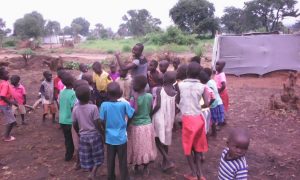LIVING IN INHUMAN CONDITIONS AND WITH UNCERTAINTIES ABOUT THE FUTURE: THE IMPACTS OF SOUTH SUDAN’S CIVIL WAR ON CHILDREN
By Phillip Andruga – The United Nations Convention on the Rights of the Child has 54 articles which cover all aspects of a child’s life and set out the civil, political, economic, social and cultural rights that all children everywhere are entitled to.
For instance, in Article 19 of the Convention it is stated that “all children have the right to be safe from violence” and Article 28 spells out “the right to education of all the children”.
In South Sudan, however, due to the ongoing civil war, things have taken another direction. Hundreds of thousands of children have been forced to move into refugee camps in the neighbouring countries or camps for internally displaced persons (IDPs) within South Sudan. Almost all of them have lost the opportunity to have a good education and, unfortunately, some have even lost their lives because of violence.
South Sudan has enacted the ‘Child Act 2008 of South Sudan’ and ratified the UN Convention on the Rights of the Child in May 2015. By doing so, it took a critical step towards protecting and promoting the rights of all children. This country has, therefore, by law the obligations to respect, protect and fulfil the human rights of all children. Sadly, the country is failing to implement these laws and the rights of children are unfortunately violated all across the country.
Hundreds of thousands of children have been recruited to serve as child soldiers. Other thousands have become refugees in neighbouring countries, mostly in Uganda, and thousands are living as internal displaced persons, often separated from their families and uncertain about their future and safety. As if this was not enough, many have had their parents killed in the conflict and become victims of sexual abuse.
I have recently done a pastoral visit to some refugee camps in Uganda and have found out that many of these war-victim children have lived or are living in violent and terrorizing environments. They have witnessed and experienced horrors and so are traumatized. Their homes have been destroyed, in some cases they have witnessed their parents, siblings, neighbours and their friends being killed.
They have gone through uncertain circumstances or conditions where they had to make critical survival decisions and often lived in situations where they believed they would die at any time.

South Sudanese children playing at a refugee camp in Uganda
In my pastoral visit I have realised that these children have been very vulnerable and unprotected both during fighting and when making dangerous escapes. Those who were unaccompanied have been even more vulnerable. Now as homeless and orphans they live on the extreme edge of the refugee experience.
The United Nations Agency for Children (Unicef) has handled the cases of at least 2,892 unaccompanied children who got separated from parents during conflicts.
We held a meeting in one of the refugee camps in Moyo District during which we heard a group of children. I heard from them heartbreaking stories, touching accounts of the ordeals they have been through while running away from violence in South Sudan.
Some have described how they witnessed their parents being slaughtered by soldiers who came to their home at night. One can imagine how deeply traumatized these children are. Such an experience will mark and disturb them for the rest of their lives, if they are not offered psychosocial support adequately.
Girls are particularly more vulnerable and prone to sexual violence. I heard of cases of girls who were exploited and defiled by men while on their escaping journey to the camps.
It is hard to think of what future for South Sudan if this young generation is treated in such a violent manner. Their needs are many. They need help to cope with life in this hard and traumatic situation. Help that goes beyond providing for their basic needs, to help them to survive, be safe and protected. They need psychosocial support, healing, care and love. But they also need their infancy back and a future. They need a home and dignity.
What can the world do to help South Sudan to stop this conflict and restore peace?
What should South Sudan do to end this senseless war that is destroying the country and the lives of innocent people, including children, and uphold and implement the laws that guarantee the rights to life, safety and education of children?
Fr. Phillip Andruga (MCCJ)

